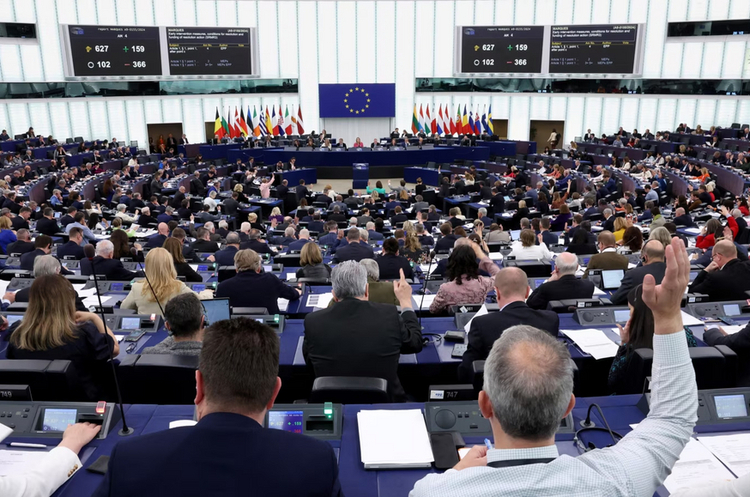Results of the European Parliament elections: ‘Centre holds on’ but right-wing parties win in all major EU countries
In Germany, the far-right Alternative for Germany has beaten all three parties that were part of the Scholz coalition

After the European Parliament elections, the balance of power will change compared to the previous convocation. However, not to the extent that a powerful anti-Ukrainian lobby will be formed, according to the BBC.
The results suggest that the centrist blocs will retain their majority: according to preliminary data, the centre-right European People's Party will win approximately 190 seats, the Socialists and Democrats will remain in second place with 135 seats, and the liberal Renew group will retain third place with 80 seats.
Thus, in general, the centrist parties retained their positions.
At the same time, we can also talk about the victory of right-wing and far-right parties – especially compared to the last European Parliament elections in 2019.
The most striking victory was won by Marine Le Pen's National Rally, which won 30 of the 81 seats reserved for France in the European Parliament. This is twice the number of votes cast for President Emmanuel Macron's liberal Renew coalition.
"Italian Prime Minister Giorgia Meloni's Brothers of Italy won 24 seats and increased its representation in the European Parliament. Almost 29% of voters cast their ballots for this right-wing party, and this result has cemented Maloney's position as the dominant figure in her ruling coalition and will help in negotiations with other European leaders.
In Germany, the far-right Alternative for Germany outperformed all three parties in Scholz's coalition and came in second after the conservative CDU-CSU opposition, winning 15 seats in the European Parliament. Despite the recent scandals, the AfD gained 15.6 per cent of the vote, one of the best results.
According to exit polls, ultra-conservative and nationalist parties also made significant gains in Austria, Greece and the Netherlands, where Geert Wilders' far-right Freedom Party managed to win 6 seats in the European Parliament.
The far-right also made progress in Spain, and in Cyprus, the far-right ELAM party won a seat in parliament for the first time in history.
As the publication notes, the failures of some parties, in particular the Greens, are also evident.
The growth of support for the Greens on the wave of environmental enthusiasm was short-lived. In the new European Parliament, they will receive about 50 seats – in the previous Parliament, the Greens had 71 seats.
The Greens suffered their heaviest losses in the largest EU member states, particularly in Germany, where they are part of a coalition government that proposes unpopular laws.
In addition to the major defeat in France, the liberal Renew group suffered significant losses in Germany and Spain, and as a result, its representation in the European Parliament decreased by about 20 MPs. It held on to third place thanks to increased support in countries such as Slovakia.
However, centrist parties retained their majority in the new parliament.
The centre-right European People's Party (EPP) will be the largest political force in the new European Parliament. It managed to win six new MPs, with various estimates giving it between 184 and 191 seats.
In Poland, the centrist Civic Coalition of Prime Minister Donald Tusk, a member of the EPP, is expected to win over the Law and Justice conservatives.
In Spain, the centre-right People's Party, also a member of the EPP, came out on top, ahead of the party of Socialist Prime Minister Pedro Sanchez.
The centre-left Socialists and Democrats will become the second largest political bloc, although they have lost four lawmakers and, according to exit polls, can expect to win 135 seats.
According to preliminary data, the pro-European centre-right, centre-left, liberal and green parties will retain a majority of 460 seats in the 720-seat parliament, although it will be slightly less than the 488 in the previous parliament, which had 705 members.
For more information on why a ‘political earthquake’ occurred in France after President Macron dissolved the lower house of parliament, read Mind's article ‘Early elections in France: what happened, why and what to expect next?’.
If you have read this article to the end, we hope that means it was useful for you.
We work to ensure that our journalistic and analytical work is of high quality, and we strive to perform it as competently as possible. This also requires financial independence. Support us for only UAH 196 per month.
Become a Mind subscriber for just USD 5 per month and support the development of independent business journalism!
You can unsubscribe at any time in your LIQPAY account or by sending us an email: [email protected]



